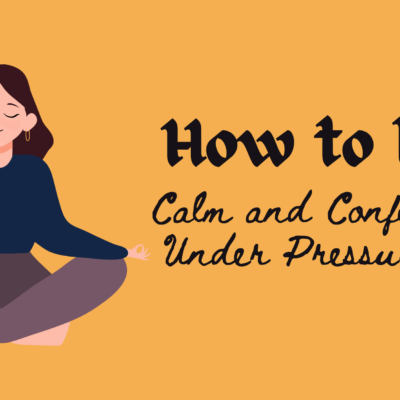How to be Calm and Confident under Pressure: Life often throws unexpected challenges our way, and how we handle them defines our success and well-being. Whether it’s a high-stakes presentation, an important exam, a job interview, or a personal crisis, staying calm and confident under pressure can make all the difference. However, managing stress and maintaining confidence in difficult situations isn’t always easy. It requires self-awareness, mental discipline, and practical strategies.
In this article, we will explore effective techniques to help you stay composed, confident, and in control even in the most challenging circumstances.
Also Read:
- How to Deal with Anxiety and Procrastination?
- How to Stop Constant Worrying and Overthinking?
- Extreme Mental Fatigue: Causes, Symptoms, and Effective Treatments.
Understanding Pressure and Its Effects
Before diving into strategies, it’s important to understand how pressure affects the mind and body. When we feel stressed or overwhelmed, our body releases cortisol and adrenaline, which trigger the “fight or flight” response. While this is useful in dangerous situations, too much stress can lead to:
- Increased heart rate and sweating
- Racing thoughts and inability to focus
- Self-doubt and fear of failure
- Impulsive decisions and emotional reactions
Recognizing these symptoms early can help you take steps to regain control before the pressure becomes overwhelming.
1. Shift Your Mindset: Reframe Pressure as an Opportunity
One of the biggest reasons people struggle under pressure is that they see it as a threat rather than a challenge. Instead of thinking:
- “I can’t mess this up.” → Think: “This is my chance to prove my skills.”
- “I’m going to fail.” → Think: “I’ve prepared for this, and I’ll do my best.”
- “Everyone is judging me.” → Think: “I have valuable things to contribute.”
When you reframe pressure as an opportunity, it reduces fear and boosts confidence.
2. Control Your Breathing and Physiology
When we feel anxious, our breathing becomes shallow and rapid, which increases stress. To counter this, practice deep breathing techniques:
Box Breathing Technique:
- Inhale for 4 seconds.
- Hold your breath for 4 seconds.
- Exhale slowly for 4 seconds.
- Pause for 4 seconds before inhaling again.
Repeating this cycle for a few minutes calms the nervous system, reduces stress hormones, and brings clarity to your thoughts.
3. Prepare and Practice
Confidence under pressure comes from preparation. Whether it’s a public speech, an exam, or a high-stakes negotiation, preparation gives you a sense of control and readiness.
- For Presentations: Rehearse multiple times, anticipate possible questions, and prepare backup materials.
- For Exams: Create a study schedule, take mock tests, and practice recall techniques.
- For Difficult Conversations: Plan your key points, practice responses, and anticipate objections.
The more prepared you are, the more naturally confidence will flow.
4. Use Visualization Techniques
Athletes and performers often use visualization to improve performance under pressure. This involves mentally rehearsing success before the actual event.
How to Visualize Success:
- Close your eyes and imagine yourself performing confidently in the stressful situation.
- Picture every detail: your posture, voice, expressions, and positive reactions from others.
- Feel the emotions of success—pride, confidence, and accomplishment.
This trains your brain to associate pressure with positive outcomes, making you feel more in control when the moment arrives.
5. Develop a Pre-Performance Ritual
Creating a pre-performance routine helps signal your brain that it’s time to focus. This could include:
- Listening to motivational music
- Doing a short breathing exercise
- Repeating a personal mantra like “I am prepared, I am confident.”
- Visualizing success for a minute
This ritual grounds you, helping you stay centered and composed before facing pressure.
6. Manage Negative Self-Talk
One of the biggest confidence killers under pressure is self-doubt. Our minds often exaggerate fears, making us feel incapable or unprepared. To counter this, challenge your negative thoughts:
- Identify the thought: “I’m going to mess this up.”
- Challenge it: “I have prepared for this. Even if I make a mistake, I can recover.”
- Replace it with a positive statement: “I am capable and ready for this challenge.”
This simple mental shift can boost confidence and prevent anxiety from taking over.
7. Focus on the Present Moment
When under pressure, many people get trapped in “what-if” scenarios:
- “What if I forget everything?”
- “What if I fail?”
- “What if people judge me?”
These thoughts increase anxiety and distract from what you need to do right now. Instead, shift your focus to the present moment:
- Ground yourself by paying attention to your surroundings.
- Concentrate on the task, not the outcome.
- Use mindfulness to bring your focus back whenever your mind starts to wander.
The more present you are, the less pressure will affect you.
8. Maintain a Strong Body Language
Your posture and expressions directly affect your confidence levels. Studies show that adopting a powerful stance can boost self-esteem and reduce stress.
Power Poses to Boost Confidence:
- Stand tall, shoulders back, chin up.
- Avoid crossing arms or looking down.
- Use open, relaxed hand gestures.
Even if you don’t feel confident initially, acting confident can trick your brain into believing you are.
9. Accept That Pressure is Normal
Many people believe that feeling nervous means they are not ready or not good enough. But in reality, even the most successful individuals experience pressure. The key is to accept it instead of fighting it.
- Tell yourself: “It’s okay to feel nervous. It means I care about this.”
- Use your nervous energy as motivation rather than fear.
- Understand that even if things don’t go perfectly, you can still succeed.
When you normalize pressure, it loses its power over you.
10. Learn from Experience
Every time you face a high-pressure situation, you gain valuable experience. Instead of fearing these moments, embrace them as learning opportunities:
- After the event, reflect on what went well and what could be improved.
- Write down your biggest lessons and strategies that worked for you.
- Over time, the more pressure you face, the better you’ll handle it.
With each experience, your ability to stay calm and confident under pressure improves.
Conclusion
Staying calm and confident under pressure is not about eliminating stress completely—it’s about managing it effectively. By preparing in advance, controlling your breathing, maintaining strong body language, and shifting your mindset, you can navigate high-pressure situations with confidence.
Remember, confidence is a skill that can be developed. The more you practice these techniques, the better you’ll become at handling pressure effortlessly.








